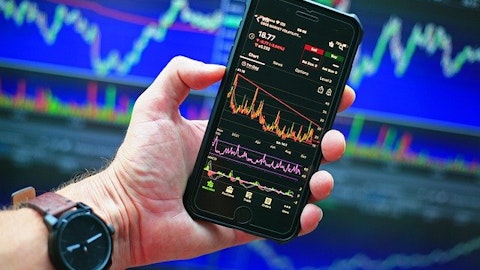Matthew Desch: Yes. We didn’t tell you what their revenue was. We didn’t give you what their markup was. It’s obviously above that $5 million if they’re roughly a break-even business on us today already. So their business has proceeded very well. And I think it’s an inflection point because in technology that they’ve been developing, which will make their business even more cost-effective in the market. But I do believe that there are a lot of synergies that they weren’t able to go after because we can lay down that signal. I mean that was — that $5 million was expensive to them. As you could imagine that constrained their business. If they lit up the whole world, it would have been many times that cost and they really weren’t ready to do that.
We can light up the rest of the world because we’re not really using any additional capacity or anything to do that. It’s a little more power on our satellites, which we have plenty of, and can start marketing services, say, to the whole maritime market and cover the whole Pacific Ocean or the Red Sea where there’s an awful lot of GPS jamming and spoofing and that sort of thing going on or other conflict zones around the world without impacting their business. So together, I think there is a lot of synergy.
Louie DiPalma: That makes sense. And related to all of the commentary on the IoT customer seemingly going by a fixed price contract over the next two years, is that related to the new 9604 terminal that you’re releasing next year and that you’ve discussed how the pricing for the midband multimedia applications will be higher than the traditional narrowband price plans? So did the customer just want visibility in terms of the spend that they would have for the Iridium network? Is that related at all?
Matthew Desch: I believe it is related above all. I really want to go into that at this point here. But certainly, as technology transitions occur and new offers go into the market, the ability to kind of manage that effectively, collectively was in our common interest. So yes, I would say that that was somewhat related.
Louie DiPalma: And I guess would there be other customers that could adapt similar pricing structures this year that would have an even greater positive benefit that’s not currently contemplated in the guidance?
Thomas Fitzpatrick: I don’t think so, but it’s always possible. I mean, we’re constantly working with our partners on what’s the most effective way of kind of managing on a fair basis, what the cost and prices of our services. So we’re always in those discussions, but I don’t think there’s going to be any others like that.
Louie DiPalma: That makes sense. And one final one, you’ve discussed a lot of the competitive dynamics and some of the competitors in the D2D realm have been talking about offering voice services. And I was wondering for Project Stardust, will it be possible for Iridium to offer voice services? And can you assess the — what you think of the viability of competitors offering D2D voice services?
Matthew Desch: We’re looking into that, but frankly, I don’t really see that voice services are going to be in the market via D2D for at least a couple of years. And even when they do, they’re going to be very limited in terms of the markets that they’re going to be providing. I mean, as you know, that there’s really D2D as has been projected for the next at least five to eight years is a regional-based solution that really expands the footprint of cell phone use within a market, not even clear if it realm, certainly doesn’t operate in Europe or probably South America will not operate in the maritime environment, etc. So the fact that a cell phone can operate go from, I don’t know what current coverage of cell phone usage is about 11%, 12%, 13% of the year surface.
And if it expands a couple of percent including voice and data, I really don’t think, again, that’s our business. That is not how our devices are being utilized. It hasn’t been our expectations as we provided guidance — we don’t — as I’ve said publicly in these meetings, we don’t sell to Wyoming, Wyoming determined for that is, I don’t even know to use in Wyoming. We — if the market expands there, we sell it to them because they are firefighters who are operating — going to South America for the latest flood. We’re not being used by the Broward County rescue services because they don’t have cell phone usage. It’s for when the hurricane happens or when they end up being redeployed down to Haiti or some other place where there is a disaster.
So this sort of focus that everyone has on what currently is the coming of D2D services on smartphones is really not something that we are — we believe, is really a direct competitor to us anywhere in the near to medium term, and we will be in that market in the same time frame as well with some services that even if it sort of has an effect around the edges of our service that we would make up easily in what we’re doing ourselves. So that’s why we feel so confident in our projections to 2030. We believe our L-band global footprint and the 25 years we’ve been in operation and the services we have are very resilient and robust and are not really at risk as apparently people must fear. And I think that will just come to be understood in the coming quarters and years and we’ll just have to continue to execute and demonstrate that.
Louie DiPalma: And related to this discussion, how unique is the push-to-talk service to Icom? And that you design your own satellite, handset, radio. Are you able to also offer push-to-talk or is that something that only Icom does?
Thomas Fitzpatrick: No. Some of our push-to-talk, and that’s a growing business for us, use our handset. I think the majority use the Icom handset and we encourage that. I mean, Icom is a fantastic device. We promote it. We don’t care if they use ours or theirs, it’s just an alternative. Ours is maybe a better device if you’re also doing point-to-point satellite phone usage, if that’s more of an application. But I think Icom integrates better into public safety networks because of their global scope and capabilities. So, I mean, yes, really, it’s being offered by a lot of our partners today, and I’m excited if they’re using Icom’s portfolio, because it’s great.
Louie DiPalma: Awesome. Thanks, Matt. Thanks, everyone. Thanks, Tom.
Thomas Fitzpatrick: Thanks, Louie.
Matthew Desch: Thank you, Louie.
Operator: And ladies and gentlemen, this concludes our question-and-answer session. I’d like to turn the conference back over to management for closing remarks.
Matthew Desch: Well, you can see why we’re probably going to be out talking to investors and conferences, a lot more in the coming weeks and months here. And I’m sure we’ll see you on the road as we do that and see you next quarter regardless. Thank you very much. .
Operator: Thank you, sir. This concludes today’s conference call. We thank you all for attending today’s presentation. You may now disconnect your lines, and have a wonderful day.
Follow Iridium Communications Inc. (NASDAQ:IRDM)
Follow Iridium Communications Inc. (NASDAQ:IRDM)
Receive real-time insider trading and news alerts





